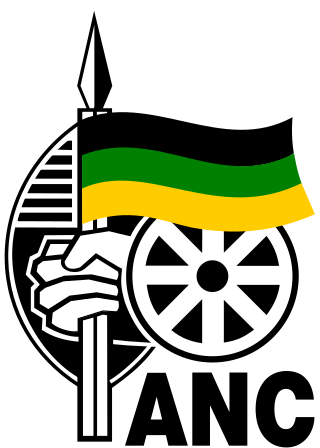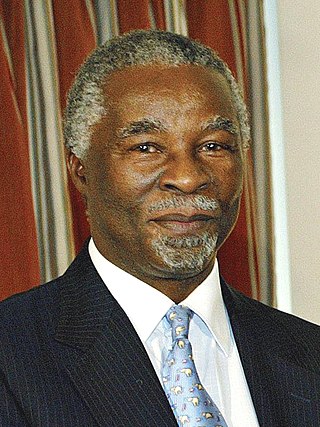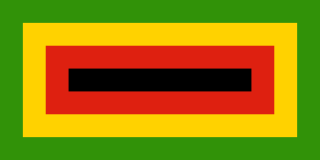Related Research Articles

The African National Congress (ANC) is a political party in South Africa. It originated as a liberation movement known for its opposition to apartheid and has governed the country since 1994, when the first post-apartheid election resulted in Nelson Mandela being elected as President of South Africa. Cyril Ramaphosa, the incumbent national President, has served as President of the ANC since 18 December 2017.
Nationalism is an identity based belief system, an idea or social movement that holds that the nation should be congruent with the state. As a movement, it presupposes the existence and tends to promote the interests of a particular nation, especially with the aim of gaining and maintaining its sovereignty (self-governance) over its perceived homeland to create a nation-state. It holds that each nation should govern itself, free from outside interference (self-determination), that a nation is a natural and ideal basis for a polity, and that the nation is the only rightful source of political power. It further aims to build and maintain a single national identity, based on a combination of shared social characteristics such as culture, ethnicity, geographic location, language, politics, religion, traditions and belief in a shared singular history, and to promote national unity or solidarity. There are various definitions of a "nation", which leads to different types of nationalism. The two main divergent forms are ethnic nationalism and civic nationalism.
Racism is discrimination and prejudice against people based on their race or ethnicity. Racism can be present in social actions, practices, or political systems that support the expression of prejudice or aversion in discriminatory practices. The ideology underlying racist practices often assumes that humans can be subdivided into distinct groups that are different in their social behavior and innate capacities and that can be ranked as inferior or superior. Racist ideology can become manifest in many aspects of social life. Associated social actions may include nativism, xenophobia, otherness, segregation, hierarchical ranking, supremacism, and related social phenomena. Racism refers to violation of racial equality based on equal opportunities or based on equality of outcomes for different races or ethnicities, also called substantive equality.

Thabo Mvuyelwa Mbeki is a South African politician who served as the 2nd democratic president of South Africa from 14 June 1999 to 24 September 2008, when he resigned at the request of his party, the African National Congress (ANC). Before that, he was deputy president under Nelson Mandela from 1994 to 1999.
White supremacy is the belief that white people are superior to those of other races and thus should dominate them. The belief favors the maintenance and defense of any power and privilege held by white people. White supremacy has roots in the now-discredited doctrine of scientific racism and was a key justification for European colonialism.
An ethnicity or ethnic group is a group of people who identify with each other on the basis of perceived shared attributes that distinguish them from other groups. Those attributes can include a common nation of origin, or common sets of ancestry, traditions, language, history, society, religion, or social treatment. The term ethnicity is often used interchangeably with the term nation, particularly in cases of ethnic nationalism.

The South African Communist Party (SACP) is a communist party in South Africa. It was founded in 1921 as the Communist Party of South Africa (CPSA), tactically dissolved itself in 1950 in the face of being declared illegal by the governing National Party under the Suppression of Communism Act, 1950. The Communist Party was reconstituted underground and re-launched as the SACP in 1953, participating in the struggle to end the apartheid system. It is a member of the ruling Tripartite Alliance alongside the African National Congress and the Congress of South African Trade Unions (COSATU) and through this it influences the South African government. The party's Central Committee is the party's highest decision-making structure.
White nationalism is a type of racial nationalism or pan-nationalism which espouses the belief that white people are a race and seeks to develop and maintain a white racial and national identity. Many of its proponents identify with the concept of a white ethnostate.
Identity politics is politics based on a particular identity, such as ethnicity, race, nationality, religion, denomination, gender, sexual orientation, social background, caste, and social class. The term could also encompass other social phenomena which are not commonly understood as exemplifying identity politics, such as governmental migration policy that regulates mobility based on identities, or far-right nationalist agendas of exclusion of national or ethnic others. For this reason, Kurzwelly, Pérez and Spiegel, who discuss several possible definitions of the term, argue that it is an analytically imprecise concept.
Racial color blindness refers to the belief that a person's race or ethnicity should not influence their legal or social treatment in society.

The Zimbabwe African National Union – Patriotic Front (ZANU–PF) is a political organisation which has been the ruling party of Zimbabwe since independence in 1980. The party was led for many years by Robert Mugabe, first as prime minister with the Zimbabwe African National Union (ZANU) and then as president from 1987 after the merger with the Zimbabwe African People's Union (ZAPU) and retaining the name ZANU–PF, until 2017, when he was removed as leader.
The term "minority group" has different usages, depending on the context. According to its common usage, the term minority group can simply be understood in terms of demographic sizes within a population: i.e. a group in society with the least number of individuals, or less than half, is a "minority". Usually a minority group is disempowered relative to the majority, and that characteristic lends itself to different applications of the term minority.
An ethnocracy is a type of political structure in which the state apparatus is controlled by a dominant ethnic group to further its interests, power, dominance, and resources. Ethnocratic regimes in the modern era typically display a 'thin' democratic façade covering a more profound ethnic structure, in which ethnicity – and not citizenship – is the key to securing power and resources.

Apartheid was a system of institutionalised racial segregation that existed in South Africa and South West Africa from 1948 to the early 1990s. Apartheid was characterised by an authoritarian political culture based on baasskap, which ensured that South Africa was dominated politically, socially, and economically by the nation's minority white population. In this minoritarian system, there was social stratification and campaigns of marginalization such that white citizens had the highest status, with them being followed by Indians as well as Coloureds and then Black Africans. The economic legacy and social effects of apartheid continue to the present day, particularly inequality.

African nationalism is an umbrella term which refers to a group of political ideologies in West, Central, East and Southern Africa, which are based on the idea of national self-determination and the creation of nation states. The ideology emerged under European colonial rule during the 19th and 20th centuries and was loosely inspired by nationalist ideas from Europe. Originally, African nationalism was based on demands for self-determination and played an important role in forcing the process of decolonisation of Africa. However, the term refers to a broad range of different ideological and political movements and should not be confused with Pan-Africanism which may seek the federation of many or all nation states in Africa.
Reverse racism, sometimes referred to as reverse discrimination, is the concept that affirmative action and similar color-conscious programs for redressing racial inequality are forms of anti-white racism. The concept is often associated with conservative social movements, and reflects a belief that social and economic gains by Black people and other people of color cause disadvantages for white people.

Communal violence is a form of violence that is perpetrated across ethnic or communal lines, where the violent parties feel solidarity for their respective groups and victims are chosen based upon group membership. The term includes conflicts, riots and other forms of violence between communities of different religious faith or ethnic origins.

The African National Congress (ANC) has been the governing party of the Republic of South Africa since 1994. The ANC was founded on 8 January 1912 in Bloemfontein and is the oldest liberation movement in Africa.

There is no single system of races or ethnicities that covers all modern Latin America, and usage of labels may vary substantially.

Anti-racism encompasses a range of ideas and political actions which are meant to counter racial prejudice, systemic racism, and the oppression of specific racial groups. Anti-racism is usually structured around conscious efforts and deliberate actions which are intended to create equal opportunities for all people on both an individual and a systemic level. As a philosophy, it can be engaged in by the acknowledgment of personal privileges, confronting acts as well as systems of racial discrimination and/or working to change personal racial biases. Major contemporary anti-racism efforts include the Black Lives Matter (BLM) movement and workplace anti-racism.
References
- 1 2 MacDonald, Michael (2006). Why Race Matters in South Africa. Harvard University Press. p. 106. ISBN 9780674021860.
- ↑ Ratcliffe, Peter (2005). Race, Ethnicity And Nation: International Perspectives On Social Conflict. Routledge. p. 78. ISBN 9781135361853 . Retrieved 1 March 2018.
- ↑ "non-racialism". Oxford Dictionaries. Archived from the original on 5 February 2018. Retrieved 4 February 2018.
- ↑ Ratcliffe, Peter (2005). Race, Ethnicity And Nation: International Perspectives On Social Conflict. Routledge. pp. 80–81. ISBN 9781135361853 . Retrieved 1 March 2018.
- ↑ "'Fascinating' video of Mugabe talking 'non-racialism' like Mandela goes viral on social media". News24. 16 September 2017. Retrieved 6 February 2018.
- ↑ "1949-1961: Period of direct action, non violent resistance and protest". African National Congress. Retrieved 6 February 2018.